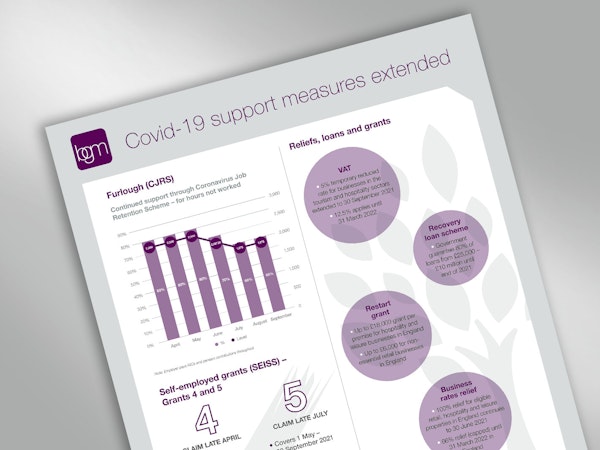Covid-19 Financial Reporting
The Covid-19 pandemic has huge financial reporting implications for entities on how income, expenses, assets and liabilities must be recognised and measured whether reporting under International Financial Reporting Standards (IFRS) or FRS 102, the principal accounting standard in the UK.
Businesses need to continuously monitor rapidly changing developments and provide meaningful disclosures in annual reports, the level and detail of which is dependent upon the impact Covid-19 has had or is expected to have, on business activity. There are two particular areas within annual reports where disclosures are expected to be provided:
- Strategic report – Disclosing the principal risks and uncertainties affecting the business, considering the extent of the risk, the degree to which the risk may crystallise, and any mitigating action taken by the company.
- Going concern statement – Disclosing the basis on which management has assessed the entity’s ability to continue as a going concern, and where there are any significant concerns, these uncertainties must be disclosed.
We set out some of the key areas where we consider how the measurement and recognition in financial statements could be affected but in the first instance it is important to ascertain whether the impact is an adjusting or non-adjusting post-balance sheet event.
Is Covid-19 an adjusting or non-adjusting event? - Guidance issued by the Financial Reporting Council implies that for most entities with a 31 December 2019 year-end, the spread of the virus after 31 December 2019 is a non-adjusting event because, at that date, only a few cases of the virus had been reported to the World Health Organization. However, for entities with later year-end reporting dates, year-end balances might be affected.
Impairment of property, plant and equipment and intangible assets - Covid-19 may trigger an impairment assessment due to a trigger event such as loss of key customer, key supplier or reduction in financial performance due to disrupted business operations.
Valuation of inventory – As at the reporting date, entities must assess whether inventory is held at the appropriate carrying value, being the lower of cost or net realisable value, which in a volatile market may require further consideration.
Recoverability of receivables - Entities are likely to be impacted by the loss of customers and significant reductions in debts being paid due to customer’s experiencing financial or cash flow difficulties.
Provisions, onerous contracts and vacant premises - Businesses need to consider whether any contracts may become onerous as a result of the pandemic, for example, where there is expected loss of revenue or increased costs associated with a contract. Where the premises are leased and become inaccessible this may be an indicator that an onerous provision may need to be recognized under FRS 102 or a right-of-use asset impaired under IFRS.
Debt restructuring and breaches of loan covenants - Entities may need to consider restructuring existing loan arrangements or may need to seek additional financing with new or existing lenders which could lead to potential breaches of existing debt covenants.
Revenue – Businesses should assess carefully the expected impact of discounts, returns, refunds, credits and potential penalties due to contract delays when assessing the amount of revenue to be recognized.
Employee benefits - Companies with employee share option schemes, are likely to be significantly affected by falling share prices which may result in alterations to the existing plans which may have significant accounting consequences for the share-based payment charge.
Defined benefit pension schemes - Covid-19 is likely to have had a significant effect on defined benefit schemes and particularly the value of plan assets with a consequential impact on the entity’s going concern status.
Government assistance - Part of the response by governments to the Covid-19 outbreak has been to introduce various relief measures and stimulus packages for businesses such as grants, business rate holidays, direct subsidies and low-interest loans which will all have an impact on financial reporting.
Insurance claims for business interruption - An insurance recovery of lost profits or revenue would not be recognised until when it is virtually certain that the loss will be reimbursed.
Filing accounts at Companies House - Companies House has announced that they may grant an extension on a filing deadline, if it becomes apparent immediately before the filing deadline that the entity will not be able to file its financial statements on time due to the impact of Covid-19.
Please contact your BGM advisor or email communications@bgm.co.uk if you would like any assistance.




